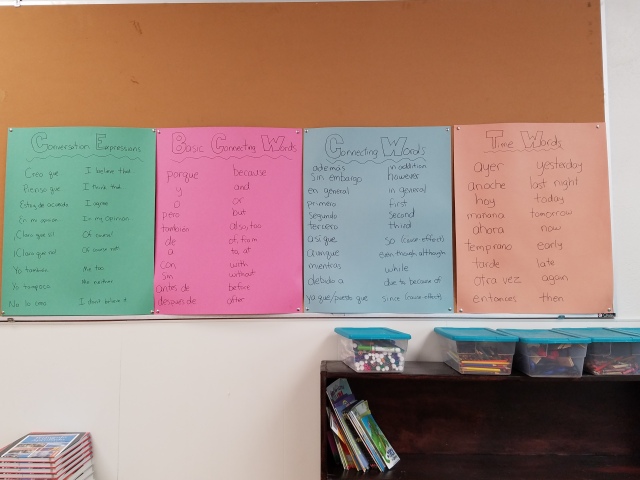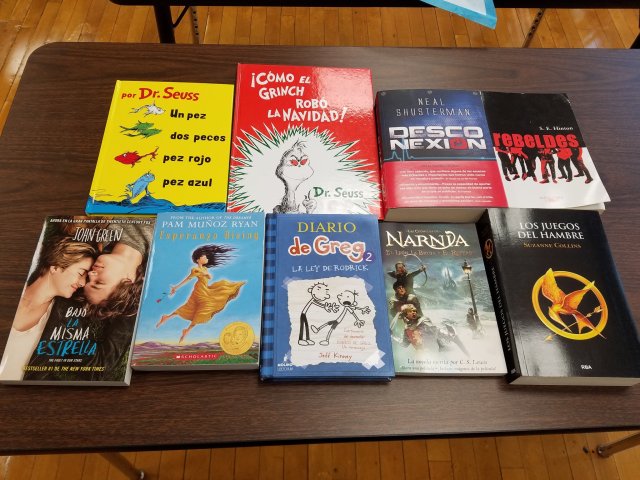Today is my last work day before students come into the building tomorrow. Since I don’t have to share rooms, move rooms, or otherwise do anything over the summer, I can leave everything more or less how it is when I finish in May. I am a major creature of habit, but I did make a few minor changes this year and I just want to show everyone what my room looks like. It’s nothing fancy – I’m no pinterest fiend – but it’s functional.
Updated word walls!
Ever since I switched to comprehensible input, I’ve had some version of word walls up. This is the third time I’ve done them and I hope the kids are nice to these, because cutting out all those words took a lot of time! (My prior versions were handwritten and I don’t have particularly nice handwriting.) A problem we also had in the past was that students couldn’t read the words when the lights were off, so I’m hoping that the white bubbles around black letters will help them stand out while still allowing for color on my bulletin board areas. (I also felt really proud of myself when I realized that with the whiteboard between the two word walls, I could use the green and red to make a Mexican-flag-like display.)
Useful phrases!

I put an image of this on twitter a while back, but I added the green poster last year. (See what I mean about the handwriting? I can’t write in a straight line to save my life.) These posters are super duper handy when pushing students into intermediate and helping them use connecting and organizational words in their speaking and writing. This year, I am considering adding a bunch of various nouns (with pictures) in that blank space above the posters as inspiration. Not in the sense that they’re inspirational pictures, but rather to help students if we’re trying to story-ask or write something and they can’t think of something interesting to happen in the story. Maybe animals or something that can function as both a character in the story or a prop – I haven’t gotten that far yet.
New books!

Most of these were either specific student requests from my end-of-year survey about the offerings of my class library or Spanish versions of popular books that I know my students like in English. I hope the students attempt some of the harder ones – I think that The Fault in Our Stars will be popular. I also got a handful of new novels from TPRS Publishing as well as expanding my collection of ones that were popular last year (Problemas en Paraíso and Rebeldes de Tejas, if you were wondering.) However, it seems that with every novel I buy, two more are released! But that’s a good problem to have, I think.
Other random stuff
In the past, I have usually placed my tables in groups of 4 to facilitate easier pair work and conversation. This year, I decided to put the tables into a horseshoe shape. #1, it will be easier for everyone to see the whiteboard/projector screen comfortably. #2, students can still easily work in pairs or small groups. #3, nobody will complain about so-and-so kicking them from across the way cause their legs are too long. #4, I think a horseshoe shape works better for discussion and storytelling. #5, I can easily get to every student without having to navigate the narrow in-between-groups spaces. My projector is still currently on a cart but hopefully it will be in the ceiling by the end of the month, which will make things even easier for me.
The other big additions this year are more curriculum based. I decided as of yesterday to add the show Gran Hotel to my Spanish 3 and AP classes on Fridays. We run a shortened schedule anyway, and it’s a nice way to end the week. I am probably going to use the guides provided by Mike Peto and Kara Jacobs to help me out.
Reading and blogging are staying around for Spanish 3 and AP. I am seriously considering expanding FVR to my Spanish 2s, though in a more limited way. (We already read 2 novels in the year.) For reading, however, I am adding Martina Bex’s Mundo en tus manos news stories to my Monday plans. Between a short reading or two and weekend chat, my Mondays are set! (Mundo en tus manos is also a fantastic addition to any FVR library. Last year’s students felt they were an easy, comfortable read at level 3.)
First days
We only have 24 minute periods tomorrow and 35 minute periods on Friday, so my plans are pretty simple. Due to the nature of my school, I know all of my returning students and I am pretty familiar with my incoming freshmen, so I get a VERY short honeymoon period. I think I am going to have ‘Relax’ by Sie7e playing as students come in. I love Sie7e because he’s got that chill summer vibe, and Relax is a very appropriate song for first-day Spanish students who are probably super nervous! I’ll say hi. Spanish 1 will do a simple me llamo/te llamas/se llama game and that’s all we’ll have time for. With the other levels, we will do a quick refresher on the syllabus and procedures, then maybe chill while listening to some favorite Spanish songs from last year. Day 2 is when I will hit that stuff with Spanish 1, and the other levels will do some conversational stuff about their vacation (or just listen to me ramble about mine which is also great). And that’s it. Nothing too fancy. Next Monday, we hit the ground running.
For funsies, I’ve included a copy of my EXTREMELY simple syllabus piktochart (again, not a lot to explain in a small school) and the image I use to explain the AP exam to my AP students. Feel free to use either of them in whole, in part, or inspirationally.



